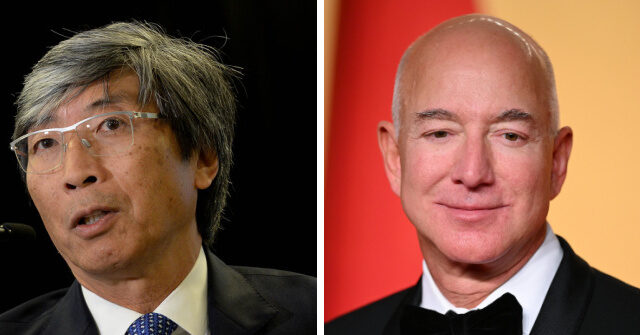The Washington Post and Los Angeles Times are “betraying democracy” by refusing to endorse Vice President Kamala Harris in the 2024 presidential election, according to the left-wing magazine The Nation, which contends billionaire owners Jeff Bezos and Patrick Soon-Shiong blocked Harris endorsements to gain the good graces of an “authoritarian and fascistic” Trump, should he win the presidency again.
In a pointed critique in The Nation on Tuesday, the magazine’s national affairs correspondent, John Nichols, argues that by avoiding endorsements, particularly of Harris, these influential newspapers are undermining the historic mission of the press to “speak truth to power.”
According to the author, billionaire publishers “who censor endorsements that offend Donald Trump confirm their scorching disregard for the traditions of a free press.”
“The founders of the American experiment did not establish constitutional protections for media outlets so that hedge-fund managers could strip newspapers for parts, or billionaires could make them political playthings,” he writes.
Nichols, who co-wrote It’s OK to Be Angry About Capitalism with Senator Bernie Sanders, argues that while billionaire owners like Bezos and Soon-Shiong have positioned themselves as “saviors of journalism” — a portrayal he calls a “fantasy” embraced even by some journalists — this ownership was never intended to support the long-term good of their publications.
“No long-term good was ever going to come of giving Amazon’s Jeff Bezos control of The Washington Post or biotech billionaire Patrick Soon-Shiong control of the venerable Los Angeles Times,” he writes, suggesting their interests lie more in influence than integrity.
He notes that, while the two billionaires initially invested heavily in these publications to help them “adjust to the digital age,” it was “only a matter of time before they abused their ownership status in order to achieve their own economic and political ends.”
The piece claims this shift became evident last week, after both the Post and the Times — under direction from their owners — abstained from endorsing a candidate in the 2024 presidential race.
Bezos and Soon-Shiong, Nichols writes, imposed this decision on their editorial teams despite the fact that many journalists at both newspapers have written extensively about the perceived “threat posed by Trump’s bid for a second term.”
According to the essay, credible accounts suggest that both newspapers’ editorial boards were “prepared to endorse Kamala Harris” until their publishers stepped in. Nichols characterizes this intervention as “overt gifts to Trump,” sidelining the editorial voices of two major national publications.
He also insists that readers see the decision not to back Harris as more than “an act of surrender to a Republican whose campaign has trafficked in racist and xenophobic messaging,” suggesting instead that it qualifies as “preelection cowardice” by billionaire owners who, by avoiding confrontation with Trump, signal a willingness to yield to his agenda if he returns to power.
The author writes that this choice conveys that the Post and the Times, two of the country’s most influential publications, may be prepared to “bend to the will of an increasingly authoritarian and fascistic commander in chief” should he win the presidency again.
On Friday, the Washington Post announced that it would not be endorsing Vice President Kamala Harris in the upcoming presidential election.In an opinion piece written by William Lewis, a publisher and chief executive officer for the newspaper, the Post explained that they were “returning to” their “roots of not endorsing presidential candidates.”
The Washington Post will not be making an endorsement of a presidential candidate in this election. Nor in any future presidential election. We are returning to our roots of not endorsing presidential candidates.
As our Editorial Board wrote in 1960:
“The Washington Post has not ‘endorsed’ either candidate in the presidential campaign. That is in our tradition and accords with our action in five of the last six elections. The unusual circumstances of the 1952 election led us to make an exception when we endorsed General Eisenhower prior to the nominating conventions and reiterated our endorsement during the campaign. In the light of hindsight we retain the view that the arguments for his nomination and election were compelling. But hindsight also has convinced us that it might have been wiser for an independent newspaper in the Nation’s Capital to have avoided formal endorsement.”
The Post’s non-endorsement of Harris in the election followed that of the Los Angeles Times, the hometown newspaper of Harris, which also refused to endorse her, despite previously endorsing President Joe Biden, former Secretary of State Hillary Clinton, and former President Barack Obama.
Harris has also faced non-endorsements from the Teamsters Union, even though polling showed that nearly 60 percent of the Teamsters members supported Trump, while 34 percent expressed support for Harris.
Joshua Klein is a reporter for Breitbart News. Email him at jklein@breitbart.com. Follow him on Twitter @JoshuaKlein.



